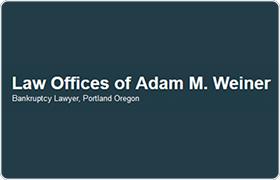Portland Collection Lawyer, Oregon, page 2
Sponsored Law Firm
-
 x
x

Click For More Info:
-
Law Offices of Adam M. Weiner
8624 SE 13th Ave Portland, OR 97202» view mapBankruptcy & Debt Premier Bankruptcy Attorney
Life doesn’t always have to be hard. Consult with a bankruptcy attorney who looks out for your best interests. Call today to begin the process for a fresh financial start.
503-719-5123
Timothy James Zimmerman
Commercial Real Estate, Civil Rights, Credit & Debt, Collection
Status: In Good Standing Licensed: 37 Years
Timothy J Zimmerman
Commercial Real Estate, Civil Rights, Credit & Debt, Collection
Status: In Good Standing Licensed: 37 Years
 Adam M. Weiner Portland, OR
Adam M. Weiner Portland, OR Practice AreasExpertise
Practice AreasExpertise
